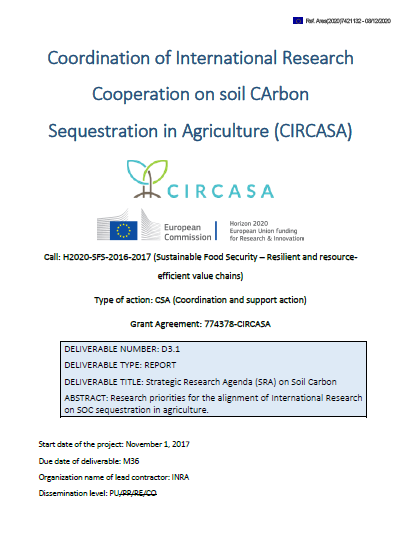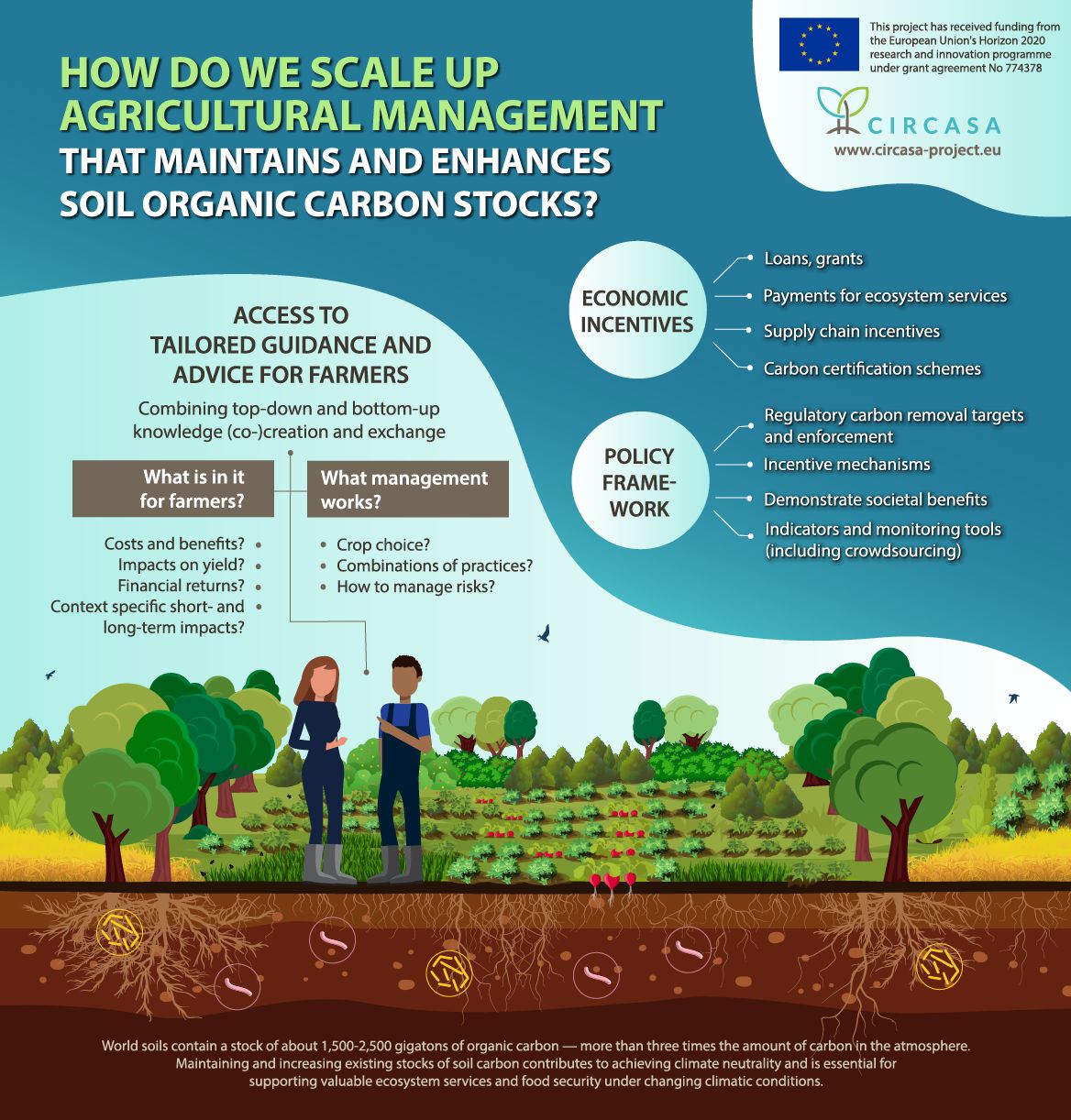Coordination of International Research Cooperation on soil Carbon Sequestration in Agriculture (CIRCASA)
- Project
- Research Program
- Duration
-
-
Soils are an enormous reservoir of carbon, containing nearly twice as much carbon as the atmosphere. Preventing soil carbon from entering the atmosphere is essential for climate mitigation efforts. Moreover, agricultural soils also carry a large potential for additional carbon sequestration, especially already degraded soils. Both preserving and enhancing soil organic carbon (SOC) has further benefits, contributing to improved soil quality, agricultural productivity, biodiversity and water protection and thus increased resilience against climate change. CIRCASA project aimed at strengthening the coordination and synergies in European and global research on SOC sequestration in agricultural soils, leading to an improved understanding and scientific basis to target ambitious practices required to preserve and enhance SOC.
Background
Research on soil organic carbon sequestration is interdisciplinary, international and rapidly increasing. There are, however, still knowledge gaps. These include, for example, questions concerning the permanence of sequestered organic carbon, longterm changes in agricultural systems and of agricultural practices in diverse pedo-climatic conditions, the difficulty of detecting improvements as well as limited understanding of socio-economic barriers and effective policy solutions for the implementation of measures.
The key challenge lies in the identification, implementation, assessment and verification of arable and grassland soil management practices which create a positive soil/ecosystem carbon budget at the farm and landscape levels, improve soil structure and soil quality and provide climate change mitigation and adaptation while contributing to sustainable development. Targeting ambitious changes in agricultural practices requires better structured international research cooperation to support public policies and stakeholders’ initiatives (e.g. policy makers, land managers and retailers).
Main objectives
The overarching goal of CIRCASA was to develop international synergies concerning research and knowledge exchange in the field of carbon sequestration in agricultural soils at European Union and global levels with active engagement of all relevant stakeholders. This included four specific objectives:
- Strengthen the international research community on soil carbon sequestration in relation to climate change and food security;
- Improve our understanding of agricultural soil carbon sequestration in different agricultural systems and pedo-climatic conditions and its potential for climate change mitigation and adaptation and for increasing food production;
- Co-design a strategic research agenda with stakeholders on soil carbon sequestration in agriculture;
- Better structure the international research cooperation in this field.
Methodology
CIRCASA applied an interdisciplinary and global approach to coordinate international research cooperation in different agricultural systems and pedo-climatic conditions through a strong international partnership. By bringing together the research community, governments, research agencies, international, national and regional institutions and private stakeholders CIRCASA took stock of the current understanding of carbon sequestration in agricultural soils, identified stakeholders' knowledge needs, and fostered the creation of new knowledge.
An online collaborative platform (OCP) structured and integrated existing knowledge in a comprehensive knowledge system on soil carbon in agriculture, delivering a scientific resource of global and local significance (e.g. maps with technical potential for diverse agricultural practices). Active dialogue with stakeholders was pursued through regular scientific and policy channels and dedicated regional/national stakeholder hubs, gathering their perspectives of SOC sequestration potential, role and management options, barriers and solutions to implementation, and knowledge demands.
A 2020-2025 Strategic Research Agenda (SRA) on agricultural SOC sequestration will be co-designed with stakeholders, grounded on scientific evidence and stakeholders' knowledge demands. The OCP and a range of state-of-the-art information and communication tools will support the communication and outreach strategy.
Ecologic Institute in CIRCASA
In CIRCASA project, Ecologic Institute led WP2, focusing on addressing stakeholders’ views – knowledge and research needs. WP2 facilitated a structured dialogue with stakeholders, gathering their perspectives on SOC sequestration, identified and assessed challenges and solutions for the implementation of SOC sequestration options, and synthesized knowledge gaps and research needs emerging from stakeholders' perspectives and their assessment of options. Ecologic Institute also contributed to structuring existing knowledge on socio-economic and policy dimensions (WP1), facilitated the establishment of an international research consortium (WP3), and organised the final policy event (WP4).





